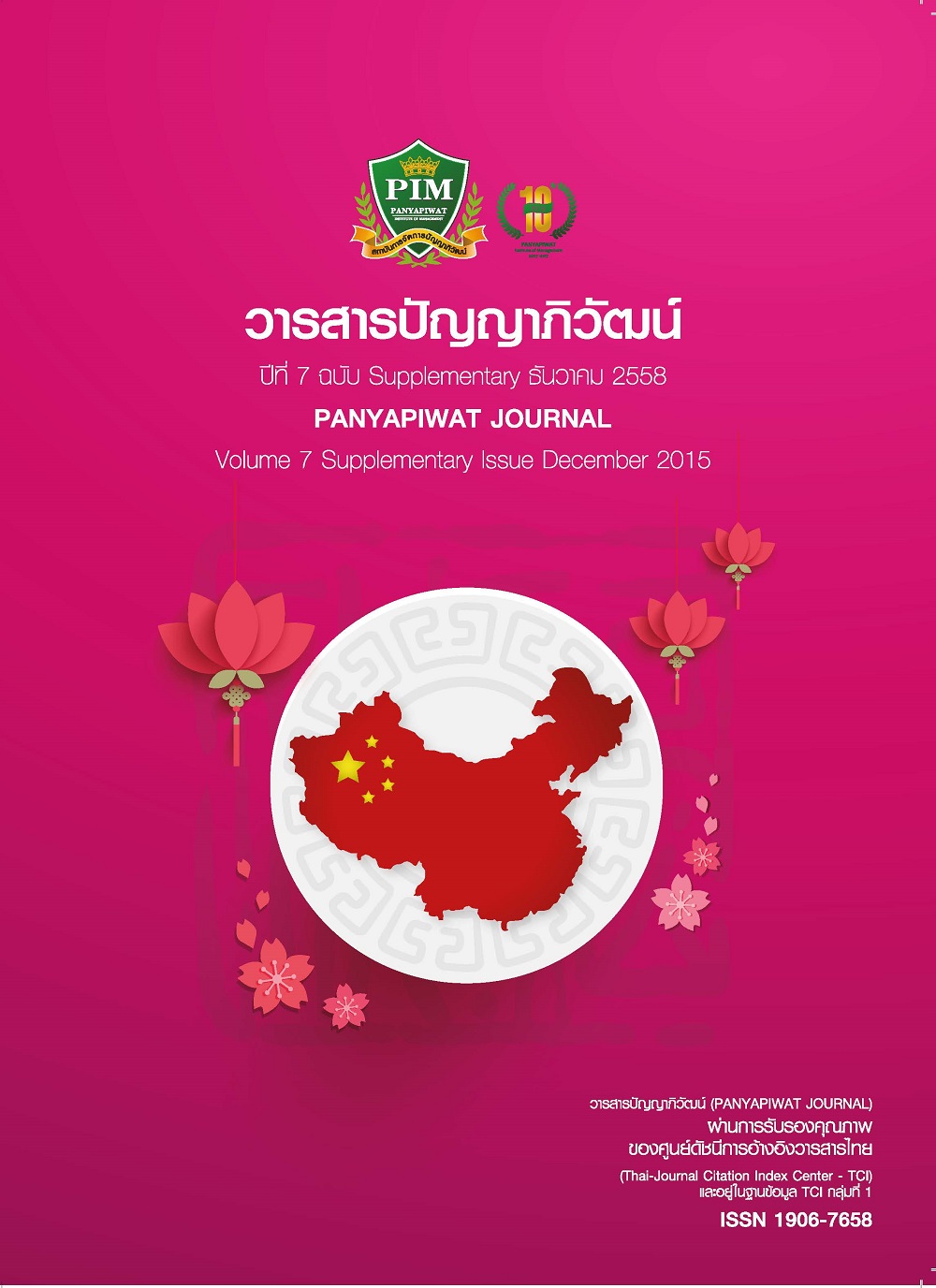生态学思维下的泰国农业中小型企业商业模式转型过程研究
Main Article Content
บทคัดย่อ
关于商业模式转型过程,特别是关于农业中小企业转型过程的研究在中文管理学界中发表的成果较少。本研究在整理既有的相关研究基础上,借助生态学的思维,针对泰国中小型农业企业的商业模式转型过程进行了分析,认为转型源于外部市场环境的变化与企业在原有生态位中的适应状况间出现了不匹配,企业可以通过调整其商业模式来重新适应变化了的市场生态位环境,达到新的生态平衡。随后以泰国某家企业为例进行了案例研究。结果在一定程度上印证了这一分析逻辑,并表明通过商业模式转型的方法进行适应是有其风险的,如果不能对这种风险进行预估和应对,企业将可能走向消亡。
The study about process of business model transformation (especially about small business in the agricultural) is less published in Chinese management scholars. This article, which with the aid of ecological thinking, analyzes Thailand business model transformation process of small and medium-sized agricultural enterprises on the basis of sorting the existing related research, concludes that there is mismatching between transformations are derived from external market’s environment change and the enterprises have to adapt to the situation in the original ecological niche, enterprise can readapt the changed market ecological niche though adjusting their business model to reach to the new ecological balance. The follow’s case research what an example to a companies in Thailand also proved partly that analyses logic and also revealed the method though transition of the business’s model to adapt the new market environment will be lead a risk, and if we cannot forecast and response this risk, the enterprise will end.
Article Details
“ข้าพเจ้าและผู้เขียนร่วม (ถ้ามี) ขอรับรองว่า บทความที่เสนอมานี้ยังไม่เคยได้รับการตีพิมพ์และไม่ได้อยู่ระหว่างกระบวนการพิจารณาลงตีพิมพ์ในวารสารหรือแหล่งเผยแพร่อื่นใด ข้าพเจ้าและผู้เขียนร่วมยอมรับหลักเกณฑ์การพิจารณาต้นฉบับ ทั้งยินยอมให้กองบรรณาธิการมีสิทธิ์พิจารณาและตรวจแก้ต้นฉบับได้ตามที่เห็นสมควร พร้อมนี้ขอมอบลิขสิทธิ์บทความที่ได้รับการตีพิมพ์ให้แก่สถาบันการจัดการปัญญาภิวัฒน์หากมีการฟ้องร้องเรื่องการละเมิดลิขสิทธิ์เกี่ยวกับภาพ กราฟ ข้อความส่วนใดส่วนหนึ่งและ/หรือข้อคิดเห็นที่ปรากฏในบทความข้าพเจ้าและผู้เขียนร่วมยินยอมรับผิดชอบแต่เพียงฝ่ายเดียว”
References
罗,李亮宇(2015). 互联网时代的商业模式创新:价值创造视角,中国工业经济,29(01),195-107.
王吉发,冯晋 & 李汉铃,(2006),企业转型的内涵研究,统计与决策,22(2),153-157.
王鑫鑫,王宗军,(2009). 国外商业模式创新研究综述,外国经济与管理,31(12),33-38 .
项国鹏,周鹏杰,(2011). 商业模式创新:国外文献综述及分析框架构建,商业研究,55(4),84-89 .
谢王丹,杨建梅(2004). 生态学理论在经济管理领域应用的研究综述,科技管理研究,24(3),125-129.
张赞,张锐,(2003). 战略生态学:战略理论发展的新方向,科学学研究,21(1), 35-40.
DiMaggio, P. & Powell, W. (1983). The iron cage revisited:Institutional isomorphism and collective rationality in organizational fields. American Sociological Review, 42(2), 147.
Humphrey, J. & Schmitz, H. (2002). How does insertion in global value chains affect upgrading in industrial clusters?. Regional Studies, 36(9), 11.
Linder, J. C. & Cantrell, S. (2001). Five business-model myths that hold companies back.
Strategy & Leadership, 29(6), 6.
Lindgardt, Z., Reeves, M. & Wallenstein, J. (2008). Waking the giant: Business model innovation
in the drug industry. In Vivo, 6(26), 6.
Malhotra, Y. (2000). Knowledge management and new organization forms: a framework for
business model innovation. Information Resources Management Journal, 13(1), 10.
McIntosh, R. P. (1985). The background of ecology : concept and theory. UK: Cambridge University Press.
Porter, M. E. (1991). Towards a Dynamic Theory of Strategy. Strategic Management Journal,(12), 23.
Venkatraman, N. & Henderson, J. C. (2008). Four vectors of business model innovation:value capture in a network era From strategy to execution. Berlin: Springer.
Zott. C. & Amit, R. (2010). Business model design: an activity system perspective. Long range planning, 43(2/3), 11.
Translated Chinese References
Luo, M. & Li, L. Y. (2015). The innovation of business model in ainternet era: persperctive from value creation. China Industrial Economics, 29(1), 95-107. [in Chinese]
Wang, J. F., Feng, J. & Li, H. L. (2006). Study on the connotation of enterprise transformation. Statistics & Decision, 22(2), 153-157. [in Chinese]
Wang, X. X. & Wang, Z. J. (2009). A review of researches on the innovation of business model. Foreign Economics & Management, 31(12), 33-38. [in Chinese]
Xiang, G. P. & Zhou, P. J. (2011). Business model innovation: Foreign literature review and construction of analysis framework. Commercial Research, 55(4), 84-89.
Xie, W. D. & Yang, J. M. (2004). A review of the application of ecology theory in the field of ecomic and management. Science and Technology Management Research, 24(3),125-129.
Zhang, Y. & Zhang, R. (2003). Strategic ecology: new direction of strategic theory development.
Studies in Science of Science, 21(1), 35-40.

